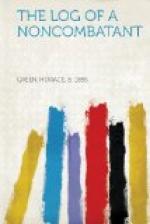All of which, though true, had no effect on the sniffling young woman across the way, nor the sleeper on the hardwood bench next mine, nor the bald-headed, big-lipped police sergeant who bent over his desk in the corner, impervious to these usual outbursts of the newly arrested, as he laboriously scrawled in the police blotter the report of the day’s round-up.
“Sit down!” he bellowed as I advanced toward the pen door, and tried to open it.
When he resumed his scratching I did my best to explain in a German-French-Dutch dialect of my own invention that we wished to see Mons. le Commissaire at once; that we had only come to inspect the concentration camp of German and Belgian prisoners, and that we were leaving town that day. I particularly emphasized this point. We were, in fact, I assured him in several different ways, leaving that very afternoon—as soon as the disagreeable mistake of our arrest was rectified. He may or may not have understood this: at all events, he wore an expression as blank and graven as Jack Rose upon the witness stand. His only answer was a vacant stare at the pit of my stomach, followed by a slow scratch-scratching on the police blotter.
In fact our arrest on that occasion was rather a Jack Rose affair; that is to say, it started by our being invited to headquarters, suspicious but not certain of our status until we finally landed behind the iron doors. Without doubt Maastricht authorities were waiting for us even as we stepped off the train, showing that we were doomed from the time we left the border. Our captor, an unctuous, pink-cheeked politzei, made his appearance not far from the internment camp. Where were we going, and why?
“To see the prisoners,” we said.
“It is possible,” said the spider to the fly, “zat I can get for you permission if you will come to ze guardhouse. Ze capitain is there.”
The “guardhouse” proved a precinct police station, and the captain was not there: instead we found a mixed crowd of civilians and militaires who looked us over and shook their heads. Next we were taken to military headquarters \n the center of the town. For fifteen minutes we hunted the evasive captain while I ran through my head the various sets of credentials stuffed in different pockets; for, being in Dutch territory, although only a few miles from the Belgian frontier on one side and the German frontier on the other, I was not quite certain which to produce. Among my letters I carried one from the German Ambassador, Count von Bernstorff, to the Foreign Office in Berlin; one from Professor Hugo Munsterberg at Harvard, and a note from the secretary of the Belgian Legation at The Hague. Unfortunately I did not have with me at the time a very helpful letter from Colonel Roosevelt, ending with the statement that the bearer “is an American citizen, a non-combatant, and emphatically not a spy.” I had promised the Colonel to use this, my trump card, only in case of necessity—and once, on a later occasion, I did so with immediate effect. On the whole, I now decided in favor of a United States passport decorated with my picture and enough vises to resemble the diplomatic history of the Continent.




